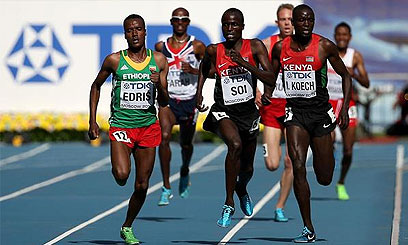
 MOSCOW, Russia, August 13- Pythons mesmerise their prey. Snake charmers mesmerise pythons. It’s time for the finalists in the men’s 5000m to decide whether they are snake charmers or snake prey.
MOSCOW, Russia, August 13- Pythons mesmerise their prey. Snake charmers mesmerise pythons. It’s time for the finalists in the men’s 5000m to decide whether they are snake charmers or snake prey.
Inevitably, Mo Farah is the snake. Nothing personal, of course, he is a very personable fellow as well as a great runner. But as the likes of Sebastian Coe and Steve Cram have been pointing out recently, he has his opponents bluffed, or mesmerised if you like, into thinking he cannot be beaten.
So there are only two choices for the other 14 runners who made Friday night’s 5000m final out of Tuesday morning’s heats. Do they want to at least try to be the snake charmer, or do they remain the helpless prey?
We might have seen the start of the answer when Farah came out for the second heat. The Kenyan pair Isiah Koech and Edwin Soi and Ethiopia’s Muktar Edris all tried to discomfort Farah over the last 2000m.
Although Farah and Galen Rupp led for much of these last five laps, they were forced to increase the pace lap by lap. From five laps out, the successive 400m stints went 62.97, 62.18, 61.08, 59.27 and, finally, 57.16. This was no walk in the park.
Ultimately, Edris sprinted clear of Soi and Koech to win the heat in 13:20.82. Rupp and Farah were fourth and fifth, taking the last two automatic qualifying spots in 13:23.91 and 13:23.93, respectively.
Given he has already run the 10,000m, whether this has taken anything out of Farah ahead of the 5000m final remains to be seen on Friday night. But if his opponents are going to start softening him up, then three laps before the finish of the final is NOT the time to start. It had to start in the heats.
If they wanted precedent, they needed only to study Luzhniki Stadium’s history and how Jurgen Straub of the former East Germany preyed on Steve Ovett in the heats of the 1500m. Ovett was coming back from the 800m final, but Straub knew he had an unbeaten record over three years of 1500m. He made the heat tough, Ovett’s pride drove him to win it, and that may have softened him up for the final – who knows?
Whatever the reason, the final result went Coe first, Straub second and Ovett third.
Hagos Gebrhiwet and Yenew Alamirew went 1-2 in the first heat. South Africa’s Elroy Gelant, Germany’s Arne Gabius and Zane Robertson of New Zealand combined to ensure a solid early pace, but there were still 13 men in a line at 3000m in 8:09.07.
Aziz Lahbabi of Morocco led at that point before ultimately fading back to 13th place and out of final contention.
Australia’s Brett Robinson dashed into the lead with two laps to go, triggering the ultimate charge to the line.
Gebrhiwet got home first in 13:23.22, a metre or so ahead of Alamirew, 13:23.48, and Bernard Lagat, who again found a way to glide through all the surges unruffled, 13:23.59. The US veteran will become the oldest ever 5000m finalist at the World Championships.
Longosiwa, along with Lagat’s US teammate Ryan Hill, took the final two automatic qualifying places with Gelant, Robinson and Zane Robertson all being rewarded for their initiative by advancing on times along with Sindre Buraas of Norway.
John Kipkoech of Kenya had a nightmare run, managing to fall once and almost fall again with two laps to run on the way to finishing 10th in 13:31.21. He then missed the last non-automatic qualifying spot by a few seconds. Dejene Regassa of Bahrain, sixth in the second heat, also went through on times with 13:25.21.
So, 14 men have some thinking to do. Of course, whatever they decide may not work out. Snake charmers sometimes get bitten, too.
QUALIFICATION SUMMARY
1 Muktar Edris ETH 13:20.82 Q
2 Edwin Soi KEN 13:21.44 Q
3 Isiah Kiplangat KEN 13:22.19 Q
4 Hagos Gebrhiwet ETH 13:23.22 Q
5 Yenew Alamirew ETH 13:23.48 Q
6 Bernard Lagat USA 13:23.59 Q
7 Galen Rupp USA 13:23.91 Q
8 Mohamed Farah GBR 13:23.93 Q
9 Thomas Longosiwa KEN 13:23.94 Q
10 Ryan Hill USA 13:24.19 Q
11 Elroy Gelant RSA 13:25.07 q
12 Dejene Regassa BRN 13:25.21 q SB
13 Brett Robinson AUS 13:25.38 q
14 Sindre Buraas NOR 13:26.69 q
15 Zane Robertson NZL 13:27.89 q